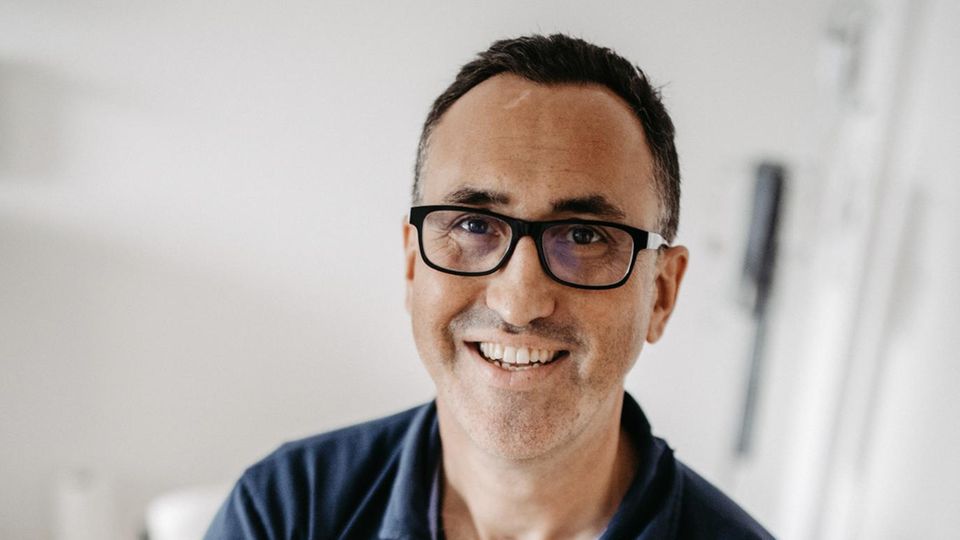interview
After crisis summit
Family doctor about announced reforms: “I think Minister Lauterbach is exaggerating here”
Karl Lauterbach after a meeting with medical representatives.
© Chris Emil Janßen / Imago Images
Health Minister Karl Lauterbach wants to relieve the burden on family doctors. What will the proposals achieve? Marc Hanefeld from Lower Saxony reports from his practice.
Federal Health Minister Karl Lauterbach (SPD) has announced major improvements in primary care. What do the announced measures bring you?
Marc Hanefeld: There’s some good stuff there. Now it will depend on what actually happens in the end and how it is implemented. If it’s just a nice poster with no content, it doesn’t help us.
One of the innovations: In the future, all services provided by family doctors will actually be remunerated, so the so-called “budgeting” will no longer apply.
That would be a good development that family doctor practices urgently need. This would mean I would actually get paid for all the treatments I perform. At the moment that is not the case. I treat so many people per quarter that at the end, when my budget is exhausted, I no longer get paid in full for everyone.
Why are you even doing this?
I’m forced to do this: With us Bremervörde is missing six family doctor offices. I’ve always said: People need a family doctor, we’ll take them in. But this has put a huge strain on me and my employees. For example, if I take on new patients who are chronically ill, it is time-consuming to familiarize myself properly and make sure not to overlook anything. At some point you can no longer work responsibly. In 2022, I have therefore also imposed a freeze on admissions for my practice.
Lauterbach promises “fewer patients in the waiting rooms” and “more time for patients” with the innovations. For example, people with chronic illnesses no longer have to come to your practice several times a year so that you can bill them. Once a year should be enough.
Such an annual flat rate would be a good change. The fact that patients have to come once a quarter for billing is no longer appropriate. But I think Minister Lauterbach is exaggerating here. I am skeptical as to whether this will really give me much more time for my patients. I still have to see many chronic patients more often in order to treat them properly. The rush comes not from recipes, but from the need for advice.
The admission ban that applies to you means that people who need a family doctor are turned away – and may then spend a long time trying to find a doctor who can treat them. What does it take?
That’s the way it is. This is a difficult situation for the patients, and for my staff and me too – we want everyone to be treated promptly. There is only one solution: we need more doctors. To achieve this, we need good working conditions in the practices and we need to significantly encourage our young talent.
You yourself used to work as an anesthetist and emergency doctor in a clinic. Why did you decide to open a family practice in 2020?
The conditions in the clinics are at least as bad. After all, as the managing director of my practice, I wanted to be able to decide for myself how I would design processes. I prefer that to being in the clinic, where I am dependent on the decisions of third parties.
As a practicing doctor, you are liable with your own income if you have prescribed too many or expensive medications. These so-called recourse cases should now be significantly reduced, by 80 percent, according to Lauterbach – will this make the job more attractive?
This is something that prevents many people from taking the step towards their own practice. That’s why this is correct. But we have to be constantly vigilant about numerous regulations and recipes. I would be surprised if this were to disappear into thin air just by increasing the trivial limits, as is now being considered. And a lot more needs to change: some of the bureaucracy we are surrounded by is crazy. I don’t think this will get better in the near future. “De-bureaucratization” is such a buzzword, but it has no substance. There is a need to reduce the rules that trigger this bureaucracy.
The promise is that digitalization will also “reduce bureaucracy”.
That’s the next one. We should finally stop being beta testers for poorly done digitalization. The electronic patient file, for example, is an absolute horror. In its current form it is unusable. We have to fill them manually with data that is actually available – crazy!


